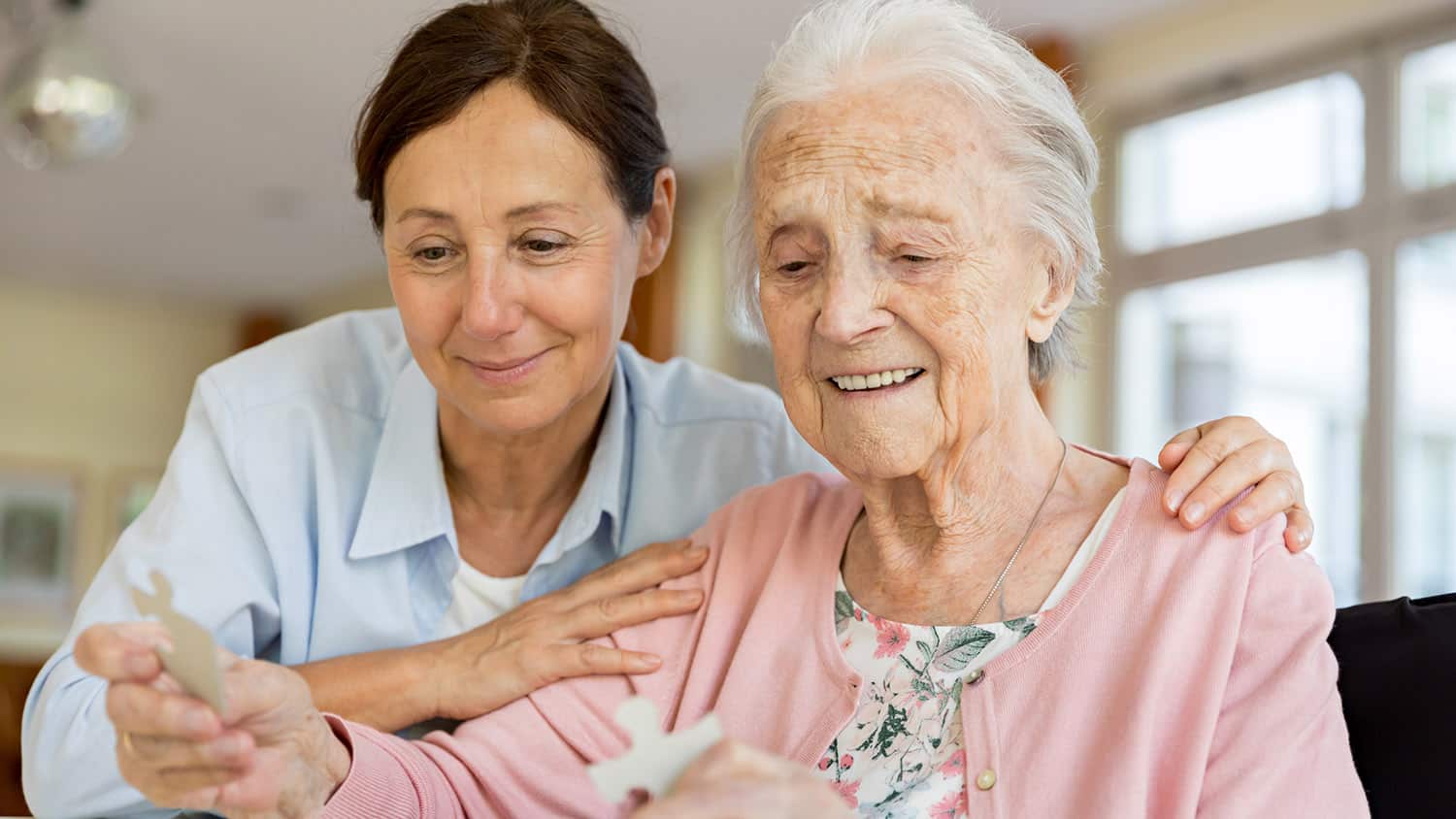
4 Common Family Caregiver Challenges and How to Overcome Them
Being a family caregiver is becoming the norm for more and more Americans, with roughly 44 million people – and growing – providing care for a loved one in the U.S.
Caregiving duties may cover a range of tasks, including transportation, health insurance wrangling and prescription management. Sometimes, more skilled care like dressing wounds and monitoring vitals is necessary. Yet, many of the challenges caregivers face are the same. These include:
Organizing Medications
Many family caregivers of elderly loved ones are tasked with keeping medications organized, prescriptions refilled, and even assist with medicine administration.
This may include dosing out the right pills, handing them to your loved one with a glass of water, and making sure they swallow all of them.
For aging adults with swallowing difficulties, a caregiver may have to crush up the pills and mix them with pudding or applesauce to help feed their loved one the correct dose.
Medication tips
- Keep an up-to-date prescription list at the ready to hand to caregiver fill-ins, emergency medical teams and for doctor’s visits.
- Use day-of-the-week (and time-of-the-day) pill boxes to pre-sort all medicines at the right doses for each day. This prevents errors and saves you the trouble of opening a ton of pill bottles each time you have to administer meds.
- Use apps and reminders to alert you and your loved one when it is time to take their medicine. Pharmacies like Walgreens usually have apps to help.
- Encourage your loved one to drink an entire glass of water when they take their medicine. Dehydration is a huge problem for elderly people, and it is a good idea to use medicine time to have them drink a good amount of water.
Incontinence
The transition from having a loved one who can go to the bathroom just fine on their own, to then needing to help them get to and from the toilet, to finally, changing briefs (diapers) and cleaning them yourself, is tough.
Oftentimes, older adults with chronic diseases like multiple sclerosis may develop weak bladders that lead to incontinence.
Sometimes, however, elderly incontinence is a product of not being able to control the urge to urinate, stress or bladder overflow. Conditions like arthritis, for example, physically make unbuttoning pants and going to the bathroom longer and more difficult.
Avoiding incontinence issues by putting off wearing incontinence pads or underwear can be stressful, time-consuming and dangerous.
Sitting in soiled clothes can actually lead to developing painful and disorienting urinary tract infections for the elderly. The right tools and products can make the transition much more manageable and less stressful.
Incontinence tools
- Underpads for surfaces your loved one sits or sleeps on to catch any leaks and minimize clean-up;
- Bedside commode for easier access for toileting;
- Briefs or incontinence underwear;
- Waterproof sheet protectors to keep mattresses dry in the case of leaks.
Difficulty Swallowing
Dysphagia, or difficulty swallowing, affects millions of seniors each year. Whether from age-related weakness in the throat or mouth muscles, or a side effect from a stroke or other chronic condition, dysphagia can make eating regularly and staying hydrated very challenging.
Caregivers are tasked with maintaining the nutrition and hydration of someone with dysphagia through blending or pureeing foods and thickening beverages to make them easier to swallow (and less likely for the person eating and drinking to choke or aspirate on them).
Dysphagia management tips
- Finding a good thickener, powder or gel, that dissolves well and doesn’t add too much flavor.
- Maintaining nutrition by blending fruits and vegetables in with regular meals like smoothies, milk shakes, soups, puddings and purees.
- Making sure your loved one sits totally upright when eating and drinking to make swallowing more efficient.
- It’s a good idea to talk to your speech pathologist about whether or not your loved one can use a straw. Many dysphagia patients are discouraged from using straws because of increased risk of choking.
- Help your loved one maintain weight by adding healthy fats to their blended meals. Things like avocado, coconut cream, Greek yogurt, peanut butter and soft cheeses can be great in that department.
Mobility Issues
There is a reason so many in the care industry – from nurses to family caregivers – experience back problems. As their loved ones, clients and patients experience issues with mobility and range of motion, caregivers are tasked with helping them get around.
Help may include lifting the loved one/patient from their bed to a chair, or providing support for them when they walk with a cane or other mobility aid.
Signs of mobility issues
- Difficulty standing for long periods of time
- Trouble ascending or descending stairs
- Pain or weakness when standing and walking
- Experiencing multiple falls
- Avoiding activity and going out
- Stiffness and limited range of motion in the legs
Recognizing these warning signs and seeking medical evaluation for your loved one is key to getting them – and yourself – the tools you need to make navigating the home environment and outside world safe and accessible.
A doctor may encourage your loved one to use an aid like a cane, knee scooter or walker to stay active. Some health care providers may even cover assistive tools and patient transfer devices. These may include sliding shower chairs, gait belts, car caddies, transfer blankets, hoyer lifts and grab bars.
When it comes to the biggest hurdles caregivers face, it’s always important to remember to ask “How can this be made easier?” and “What tools and products can help with this situation?”
Most of the time, there is something that can be done to save time, stress or money, while keeping your loved one as happy and healthy as possible.
Are you a family caregiver? What are some of the greatest caregiver challenges you face or have faced? Do you have any special tricks or tips that have saved you time and stress as a caregiver? Please share your thoughts and experiences below!






